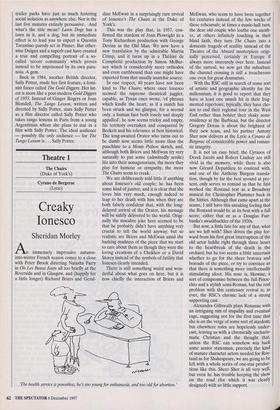Theatre 1
The Chairs (Duke of York's) Cyrano de Bergerac (Lyric)
Creaky Ionesco
Sheridan Morley
An immensely impressive autumn- into-winter French season comes to a close with Peter Brook directing Natasha Parry in Oh Les Beaux fours all too briefly at the Riverside and in Glasgow, and (happily for a little longer) Richard Briers and Geral-
dine McEwan in a surprisingly rare revival of lonesco's The Chairs at the Duke of York's.
This was the play that, in 1957, con- firmed the stardom of Joan Plowright in a Tony Richardson production with George Devine as the Old Man. We now have a new translation by the admirable Martin Crimp, and it turns up in a Theatre de Complicite production by Simon McBur- ney which is considerably more orthodox and even earthbound than one might have expected from that usually anarchic source.
In one respect, 40 years have not been kind to The Chairs; where once Ionesco seemed the supreme theatrical juggler, capable, as Tynan once wrote, 'of phrases which kindle the heart, as if a match has been struck and we glimpse, for a second only, a human face both lonely and deeply appalled', he now seems tricksy and empty, his territory overtaken and conquered by Beckett and his relevance at best historical. The long-awaited Orator who turns out to be dumb now seems little more than the punchline to a Monty Python sketch, and, although both Briers and McEwan try very naturally to put some (admittedly senile) life into their nonagenarians, the more they play for humour or sympathy, the more The Chairs seem to creak.
We are deliberately told little if anything about lonesco's old couple; he has been some kind of janitor, and it is clear that she loves him very much, enough indeed to leap to her death with him when they are both falsely confident that, with the long- delayed arrival of the Orator, his message will be safely delivered to the world. Origi- nally the macabre joke here seemed to be that he probably didn't have anything very crucial to tell the world anyway; but so realistic are Briers and McEwan amid the barking madness of the piece that we start to care about them as though they were the loving creations of a Chekhov or a David Storey instead of the symbols of futility that Ionesco clearly intended.
There is still something weird and won- derful about what goes on here, but it is now chiefly the interaction of Briers and `The health service is powerless, he's too young for euthanasia, and too old for abortion.' McEwan, who seem to have been together for centuries instead of the few weeks of these rehearsals; at times a music-hall turn, the dear old couple who loathe one anoth- er, at others infinitely touching in their blind faith, they turn The Chairs into a domestic tragedy of senility instead of the Theatre of the Absurd masterpiece origi- nally perceived, certainly in Europe if always more insecurely over here. Instead of the surreal, we now get the suburban; the channel crossing is still a treacherous one even for great dramatists.
With the RSC still in search of some sort of artistic and geographic identity for the millennium, it is good to report that they have at least one smash hit in their frag- mented repertoire; typically, they have cho- sen to end their regional tour in the West End rather than bolster their shaky semi- residency at the Barbican, but the director Gregory Doran is about the brightest of their new team, and his partner Antony Sher now delivers at the Lyric a Cyrano de Bergerac of considerable power and roman- tic integrity.
It is not an easy brief; the Cyranos of Derek Jacobi and Robert Lindsay are still vivid in the memory, while there is also now Gerard Depardieu to contend with, and use of the Anthony Burgess transla- tion, though by far the best around at pre- sent, only serves to remind us that he first worked the Rostand text as a Broadway musical for Christopher Plummer back in the Sixties. Although that came apart at the seams, I still have this sneaking feeling that the Rostand would be at its best with a full score; either that or as a Douglas Fair- banks's swashbuckler of the 1920s.
But now, a little late for any of that, what are we left with? Sher drives the play for- ward from his first great interruption of the old actor laddie right through three hours to the heartbreak of the death in the orchard, but he too seems a little uncertain whether to go for the sheer bravura and bravado of the piece, or try to convince us that there is something more intellectually stimulating afoot. His nose is, likewise, a sort of compromise between the full Pinoc- chio and a stylish semi-Roman, but the real problem with this centenary revival is, as ever, the RSC's chronic lack of a strong supporting cast.
Alexandra Gilbreath plays Roxanne with an intriguing mix of stupidity and eventual rage, suggesting not for the first time that she is on the verge of some sort of stardom; but elsewhere roles are hopelessly under- cast, leaving us with a chronically uncharis- matic Christian and the thought that, unless the RSC can somehow win back some senior statesmen, precisely the kind of mature character actors needed for Ros- tand as for Shakespeare, we are going to be left with a whole series of one-star produc- tions like this. Sheer Sher is all very well, but even he has trouble keeping the show on the road (for which it was clearly designed) with so little support.


















































































 Previous page
Previous page